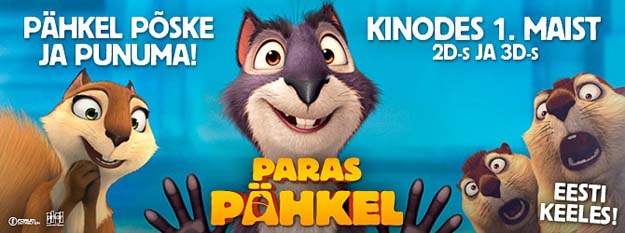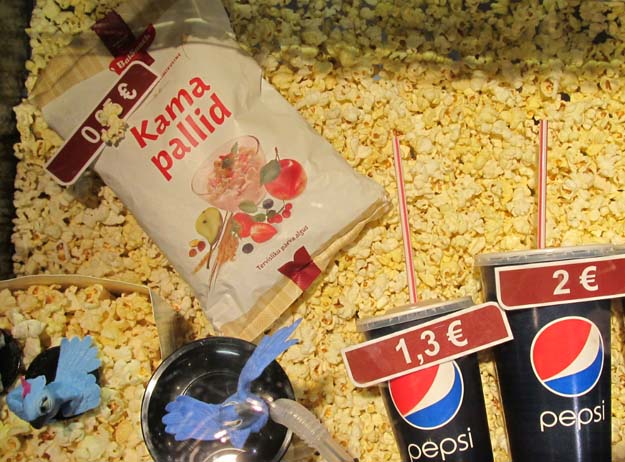 How movie titles are interpreted worldwide is always interesting. This movie just starting showing in Estonian kinod (cinemas), so a lot of people in the west must be at least somewhat familiar with these karva/näod (furry faces) and punn/põsed (chubby cheeks) belonging to the star oravad (squirrels). The original title of this laste joonis/film (animated kids’ movie) is The Nut Job. The Estonian translation Paras pähkel is an expression used to describe something that is hard to accomplish or to crack open. “A hard nut to crack” is the English equivalent, although in Estonian it can describe a person, but is more often used to describe a challenging situation. Photo: Forum Cinemas AS – Estonia
How movie titles are interpreted worldwide is always interesting. This movie just starting showing in Estonian kinod (cinemas), so a lot of people in the west must be at least somewhat familiar with these karva/näod (furry faces) and punn/põsed (chubby cheeks) belonging to the star oravad (squirrels). The original title of this laste joonis/film (animated kids’ movie) is The Nut Job. The Estonian translation Paras pähkel is an expression used to describe something that is hard to accomplish or to crack open. “A hard nut to crack” is the English equivalent, although in Estonian it can describe a person, but is more often used to describe a challenging situation. Photo: Forum Cinemas AS – Estonia
The first example I could glean from the internet was “Vana maja fassaaditööd on paras pähkel” – Facade work on an old house is “quite the nut”. In other words, it’s difficult. Paras pähkel should not be confused with para/pähkel, the more common name for Brasiilia pähkel – Brazil nut.
The subtitle of this pere/film or family movie is “No guts. No glory.” In Estonia, they went the alliteration route: Pähkel põske ja punuma = stick a nut in your cheek and go. Punuma means to weave, like patsi punuma – to braid hair, essentially weaving. But punuma is also slang for running fast (like liduma, plagama, jalga laskma, põgenema – that last one means to escape). Jänes pistis punuma – the rabbit took off.
It’s no secret, that one way of learning a new language or improving it, is to walk in step with little learners. Childrens’ books, movies and songs serve as fun and useful tools of language acquisition for everyone. If you want to read more about Paras pähkel and the Estonian actors giving the elukad (creatures) their Estonian voices and text, go : www.forumcinemas.ee/Event/299709/
And a word of advice from the oravad (squirrels), vööt/oravad (chipmunks) and other närilised (rodents), from the word närima = to chew; the advice being – try to buy your nuts in the shell (koorega), otherwise you never know how long ago they were kooritud (shelled) and many nuts, especially parapähklid or Brazil nuts, due to their particularly high fat content, can soon become rancid. Estonian squirrels call that rääsuma; rääsunud pähklid.
 Discovered at the Solaris kino snack bar in central Tallinn: in addition to the usual global movie snack fare, including popcorn (plaksu/mais) and soda, this cinema is offering kama/pallid – kama balls; officially sold as a breakfast cereal, but perfect for snacking out of the bag as well. Kama is a traditional Estonian finely milled flour mixture of roasted barley, rye, oat and pea flour. It is most often eaten mixed with milk, buttermilk or kefir and sweetened with sugar, jam or berries. Kama is also eaten in Finland, where it is called talkkuna. Kama (or why not kamapallid) can be bought as a souvenir, since it is one of the most distinctive national foods of Estonia.
Discovered at the Solaris kino snack bar in central Tallinn: in addition to the usual global movie snack fare, including popcorn (plaksu/mais) and soda, this cinema is offering kama/pallid – kama balls; officially sold as a breakfast cereal, but perfect for snacking out of the bag as well. Kama is a traditional Estonian finely milled flour mixture of roasted barley, rye, oat and pea flour. It is most often eaten mixed with milk, buttermilk or kefir and sweetened with sugar, jam or berries. Kama is also eaten in Finland, where it is called talkkuna. Kama (or why not kamapallid) can be bought as a souvenir, since it is one of the most distinctive national foods of Estonia.
Riina Kindlam,
Tallinn














